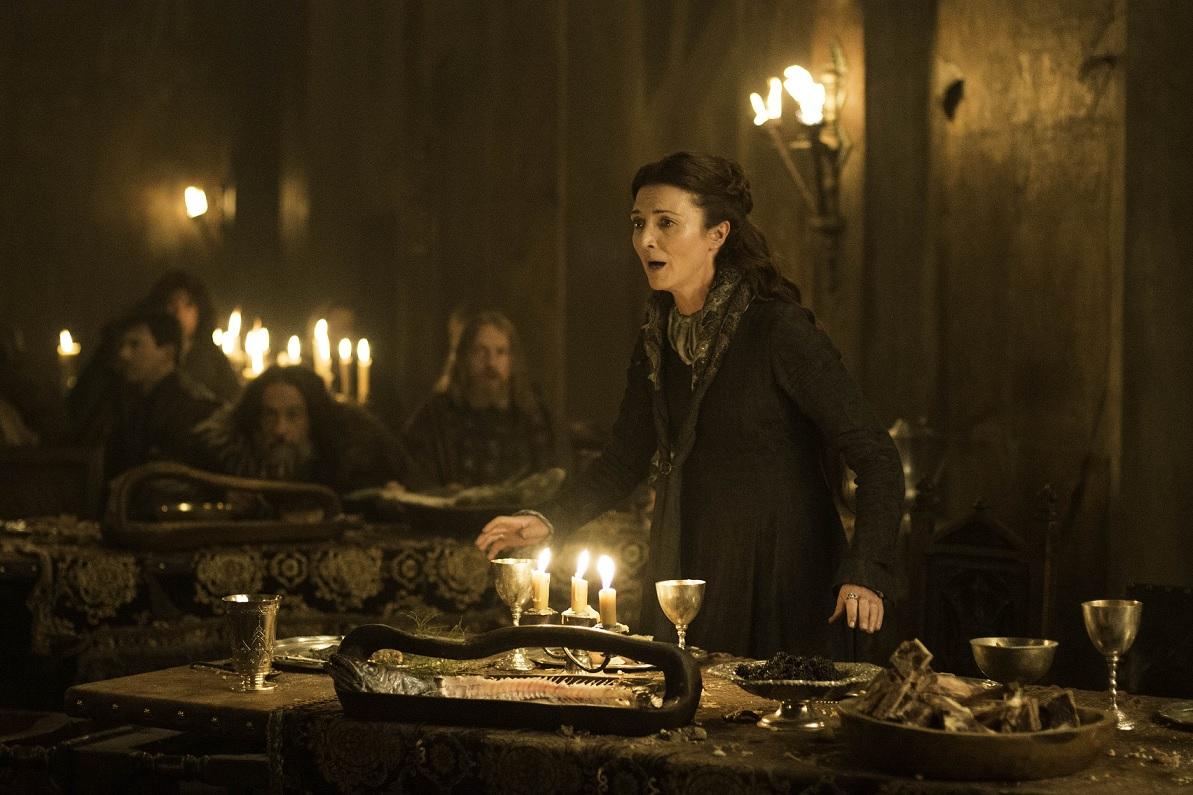
A Game of Thrones episode as pivotal as “The Rains of Castamere” requires a lot of lovin’ and a lot of attention. It stands as the dividing point of the series- everything is before or after the Red Wedding. Today we’ll be enjoying this incredible episode with three posts: after this one, we’ll have a fun look back at the fan reactions to the scene that broke the internet, and then we’ll cap the day off with Marc N. Kleinhenz’s Anatomy of a Throne analyzing the book-to-screen adaptation for the episode. Starting us off with our walk down Memory Lane- please welcome back Greatjon of Slumber! – Sue the Fury
Game of Thrones as a television show was already well accomplished by the time it reached the penultimate episode of season 3; its ratings were strong, it was hailed for close attention to character, acting, and engaging storyline, was both a critical and cultural favorite, and had tons of fans among both fans of the novels and those who discovered it via HBO. But it was this episode – more commonly known as “The Red Wedding,” that turned it into a phenomenon.
With that in mind, there’s also been a hell of a lot written about “The Rains of Castamere,” and justifiably. It remains one of the show’s most critically acclaimed episodes, but the litany of brutal deaths – including the shocking murders of three primary characters – gives it a “water cooler” appeal that is probably only rivaled by “Hardhome” and a few others that feature deaths of iconic characters.
Because so much has been written about this episode, this time on Memory Lane we’re going to try a slightly different approach, with a series of somewhat short (and shorter) observations about this hour of television. But first, let’s start with the text – not George R.R. Martin’s text, but William Shakespeare.

It is said that Shakespeare’s Romeo and Juliet could have as easily been a comedy as a tragedy. The banter and chest-beating among the younger set – Romeo’s friends and Tybalt’s entourage – is rather light-hearted in the early setpiece of the play, the Capulets’ party, where Romeo first encounters Juliet. And in fact, the play only reveals its true nature as a tragedy when Mercutio is killed at the open of Act III – which motivates Romeo to kill Tybalt, and from there, things go downhill. The same can be said of this episode (not that it’s a comedy, but that it for a time seems to be headed towards a relatively peaceful resolution). Walder Frey gives us several moments of humor, including the cringe comedy of trotting out about a dozen children and grandchildren to accept Robb’s apology for breaking his vows; his raised eyebrow later at Robb when everyone gets a good look at Edmure Tully’s bride, Roslin Frey, who is nowhere near as homely as most of the Frey offspring, and of course the nutty bedding ceremony. Until the doors close and “The Rains of Castamere” is heard, the episode’s true intentions have not been revealed. Again, this is Game of Thrones, so we have certain expectations – but that’s our past knowledge only.
This episode concludes the unstated, but crucial, link between the characters of Roose Bolton and Talisa Maegyr. The showrunners were careful – and brilliant – in their subtle means of tying Robb’s slow break from his bannermen and union with Talisa throughout seasons two and three, expressed by visually connecting Roose with Talisa in several instances:
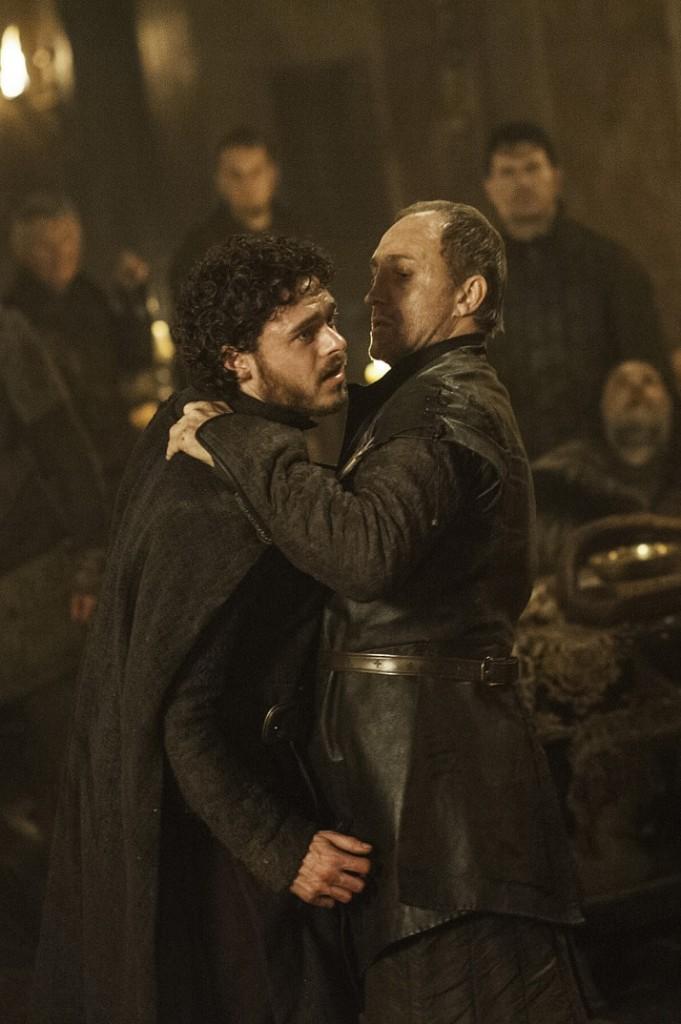
- The two characters are introduced within moments of each other in “The Ghost of Harrenhal.” Bolton’s introduction is more fleeting; at that time, we don’t know that he’s anything more than another bannerman. He gives way to the first scene with Talisa, as she amputates the leg of a wounded Lannister soldier following the Battle of Oxcross.
- Two episodes later, in “A Man Without Honor,” Robb ends a meeting with his bannermen with the imprisonment of Alton Lannister. Roose Bolton is the last to leave; he hesitates for a moment in front of Robb as Talisa approaches and asks Robb for medical supplies; only then does he turn to depart.
- The next episode, “The Prince of Winterfell,” features a conversation between Robb and Roose about the progress made by Ramsay Bolton (then unnamed) towards re-taking Winterfell. They are interrupted, again, by Talisa – a scene which ends with them making love.
- By the time season three rolls around, in “Dark Wings, Dark Words,” this time, it’s Roose Bolton who is the outsider, the one doing the interrupting, as he steps into a conversation between now-married Robb and Talisa with word of the death of Hoster Tully and that Bran and Rickon were not found in the sack of Winterfell. With the reversal of roles here, it’s a sign from the filmmakers that Talisa is the more primary advisor now, but again, serves as an important visual connection between the two.
Until now, Roose Bolton has mostly been a disapproving bannerman. In “The Rains of Castamere,” we learn much about Bolton with a few nimble gestures that involve very little dialogue – his disdain for alcohol, his shrewdness, exemplified by his decision to marry the fattest of Walder Frey’s daughters to enrich himself, and his depraved sense of humor, as he lets Catelyn in on the plot just before it commences, by glancing to his sleeve, which reveals his chain mail hidden under his clothing. It’s a showcase for Michael McElhatton, one of the show’s strongest assets.
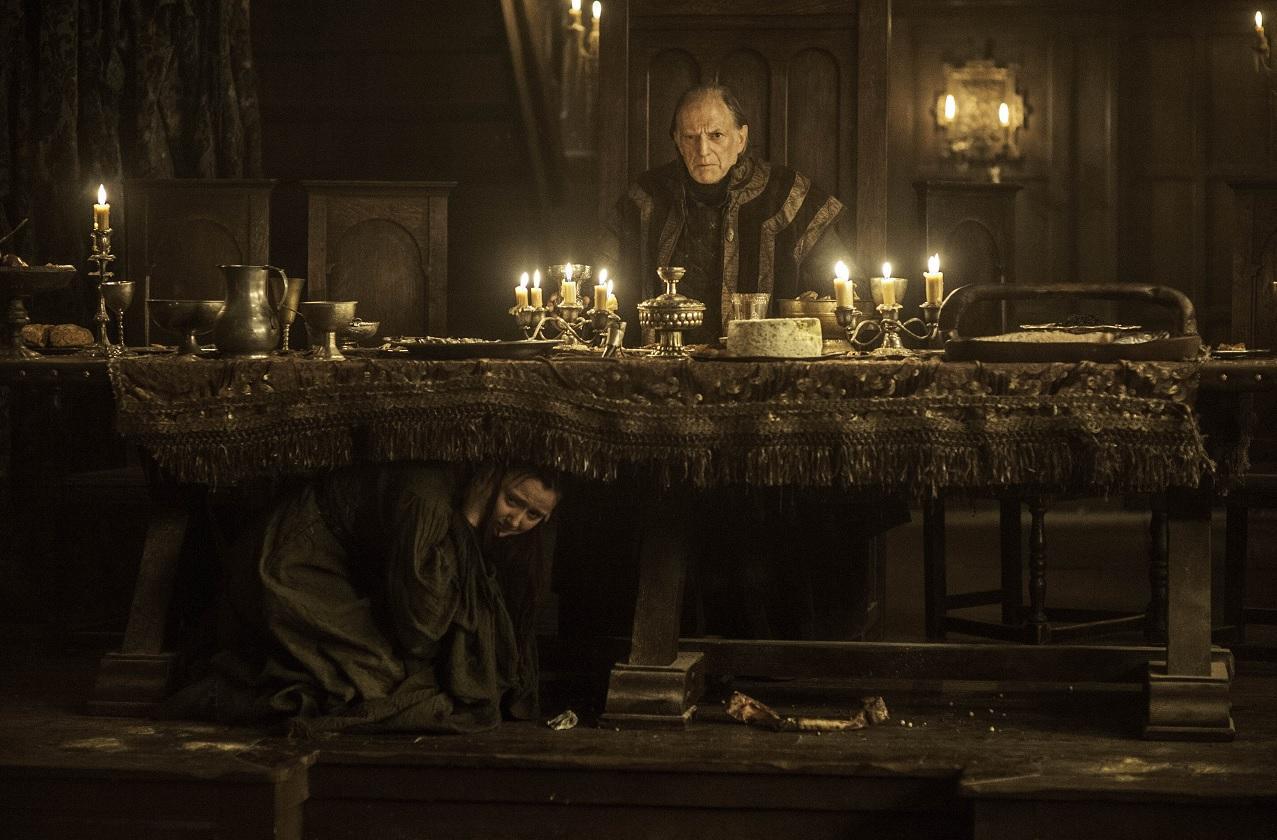
Speaking of assets, the episode’s most valuable guest player, David Bradley, does tremendous work as Walder Frey, shifting between his own wicked sense of humor and his sense of wounded pride for having had a promise reneged upon by a young man who he suspects sees him as less worthy of his respect. Classism is never far from the surface in character motivations – and Walder Frey is rightly aggrieved, given he has two assets he can offer: the crossing, and his daughters and granddaughters. Bradley is letter-perfect in this role, even just in the reaction shots to the slaughter that show him lasciviously continuing to eat while his men eliminate all of the nobility in the room.
Oddly enough – and this is the only time I’ll refer to the books – Bradley is far younger than the Walder Frey described in the book; he was 71 when the show aired, and Frey, in the books is said to be 90 years old. He also seems to lack one of the defining physical characteristics of the Freys, the “weak chin,” which Tom Brooke, who plays Lame Lothar (he’s the one who stabs Talisa), and Tim Plester, who plays Black Walder (he cuts Cat’s throat), do possess, and it’s nice to see that bit of description make its way into the casting. The costumers seem to have also decided to give most of the Freys what we should call “schmuck with earflaps” hats, another common visual cue.
This is, of course, the final episode for Richard Madden, Michelle Fairley, and Oona Chaplin. The first two get a scene at the beginning that seems designed, in part, to answer criticism that the show had removed much of Catelyn’s intelligence and made her too passive. But Robb rightly acknowledges Cat’s advice not to trust Theon Greyjoy, and he clearly has also made a mistake in marrying Talisa, just as she was arguably mistaken in releasing Jaime Lannister.
It’s hard to overstate how great Michelle Fairley is in this episode. Her final scene is full of white-hot fury, and her blood-curdling scream to close the episode is hard to forget. After she slits the throat of Joyeuse Frey, you can see the life has left her, and Black Walder’s murder of her is almost a formality.
After she falls, the show runs the credits with no music at all. It’s as if it wanted you to wrestle with what you’ve just seen without any relief from an orchestral score to calm your nerves.
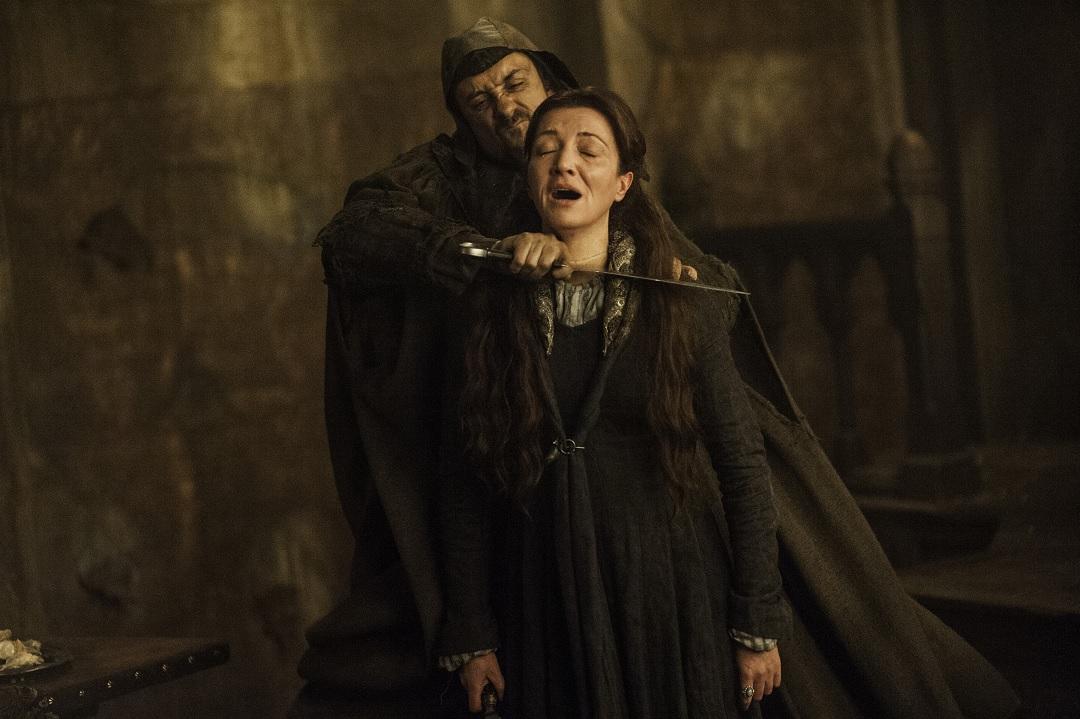
Other Observations:
- This episode has several other notable action scenes – Jon Snow kills his tormentor Orell in a fight just south of the Wall, for one. This scene also features the phenomena known as Deus ex Direwolf, though at least the show acknowledges their presence by showing them looking on before the Wildlings kill a horse breeder who supplies the Watch. It’s also curious that Tormund elects not to attack Jon himself. One could argue he’s mostly occupied by keeping Ygritte from protecting Jon – but given he’s clearly one of the best Wildling fighters, if he really wanted Jon dead, he could have done it himself. Ygritte’s reaction – not to go after Jon – is easier to understand, as she’s only starting to take the measure of his betrayal.
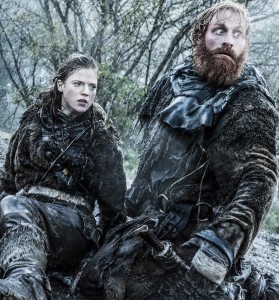
- Another scene involves a nice bit of action in Yunkai, where Daario Naharis, Jorah Mormont and Grey Worm take out about a dozen (or more?) guards in the city, featuring a showcase of their differing fighting styles, from the more formal Jorah to the somewhat more brutal Daario to the lithe, almost balletic movements of Grey Worm.
- The partnership between the Hound and Arya deepens. We see the Hound is yet again a perceptive judge of character – even with his brusque delivery. And Arya nearly matches him by throwing his injuries at him, a moment that would be revisited, more tenderly, in season 4.
- Eagle-eyed viewers will notice that standing next to Roose Bolton during the wedding ceremony is a hirsute man with a merman sigil pinned to his chest. The unnamed character is Wendel Manderly, of House Manderly of White Harbor, a city in the north mentioned at various times during the show.
- These aren’t real “departures,” as the characters in question aren’t dead, but this does mark the last time – so far – that we’ve seen Natalia Tena’s Osha, always a great presence on the show, and Art Parkinson’s Rickon. If we ever see the latter again, he’ll probably be six feet tall and tower over most of the House of Umber, where Bran sent them. Their farewell is a great, tender moment, and it also helps elevate Bran’s character – making the decision to go north of the Wall his, rather than Maester Luwin’s at the end of Season 2.
- It’s also – so far – the last appearance for Tobias Menzies (Edmure) and Clive Russell (the Blackfish).
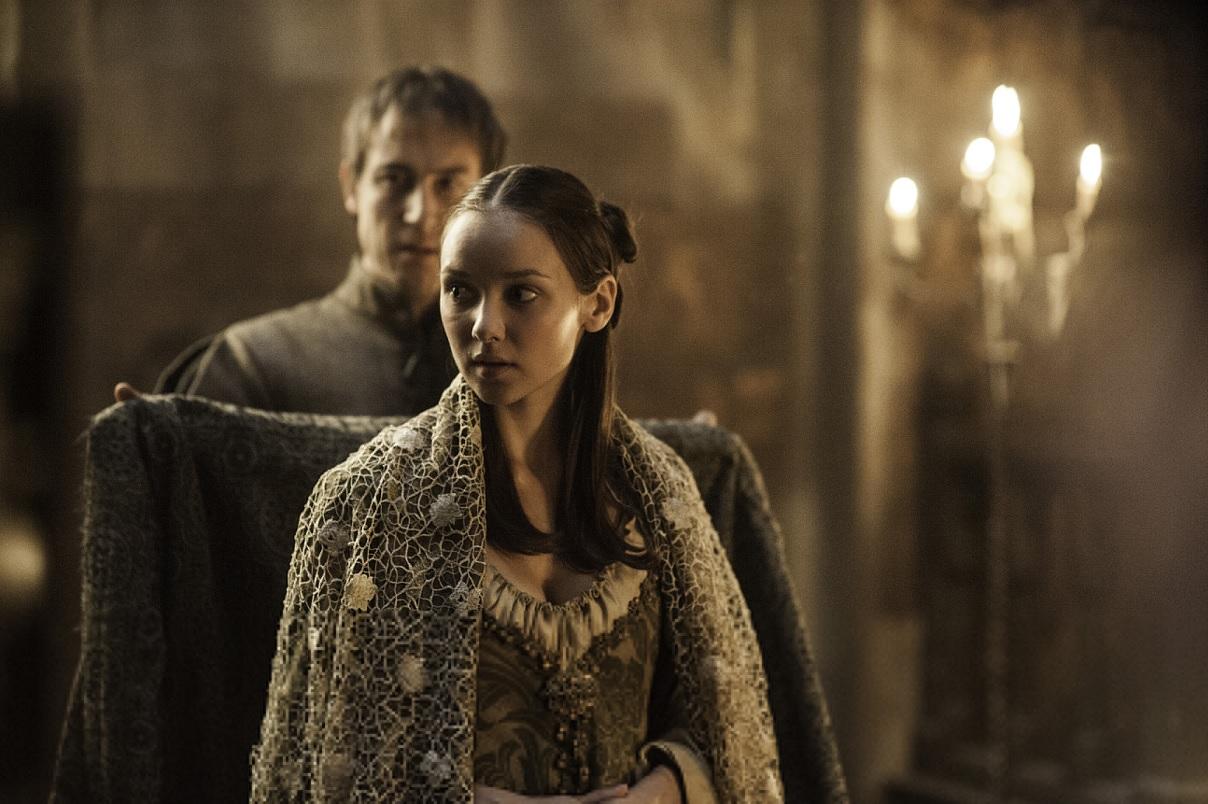
Introductions:
Joyeuse Frey, Walder Frey’s wife, looking appropriately miserable throughout the episode; Roslin Frey; the Twins’ house band, replete with crossbows, a pig farmer, a Night’s Watch’s horse breeder, daughter Walda, daughter Arwaya, daughter Derwa, daughter Waldra, granddaughter Janeya, granddaughter Neyela, Serra and Sarra – granddaughters, twins, you could have had either, could have had both, for all Walder Frey cares, granddaughter Marianne, granddaughter Freya, granddaughter, uh, “Wertha? Waira? Waldina?” Ed note: Merry (fine), and the youngest daughter, Sherei.
Departures:
Catelyn Stark; Robb Stark; Talisa Maegyr; Joyeuse Frey; Wendel Manderly; Grey Wind; any expectation for ever seeing the Greatjon again; a whole hell of a lot of Northern soldiers and bannermen, some pig’s feet, Orell, a couple dozen ineffectual Yunkai soldiers, an old man, a bunch of horses.
Beautiful Death’s The Rains of Castamere entry:
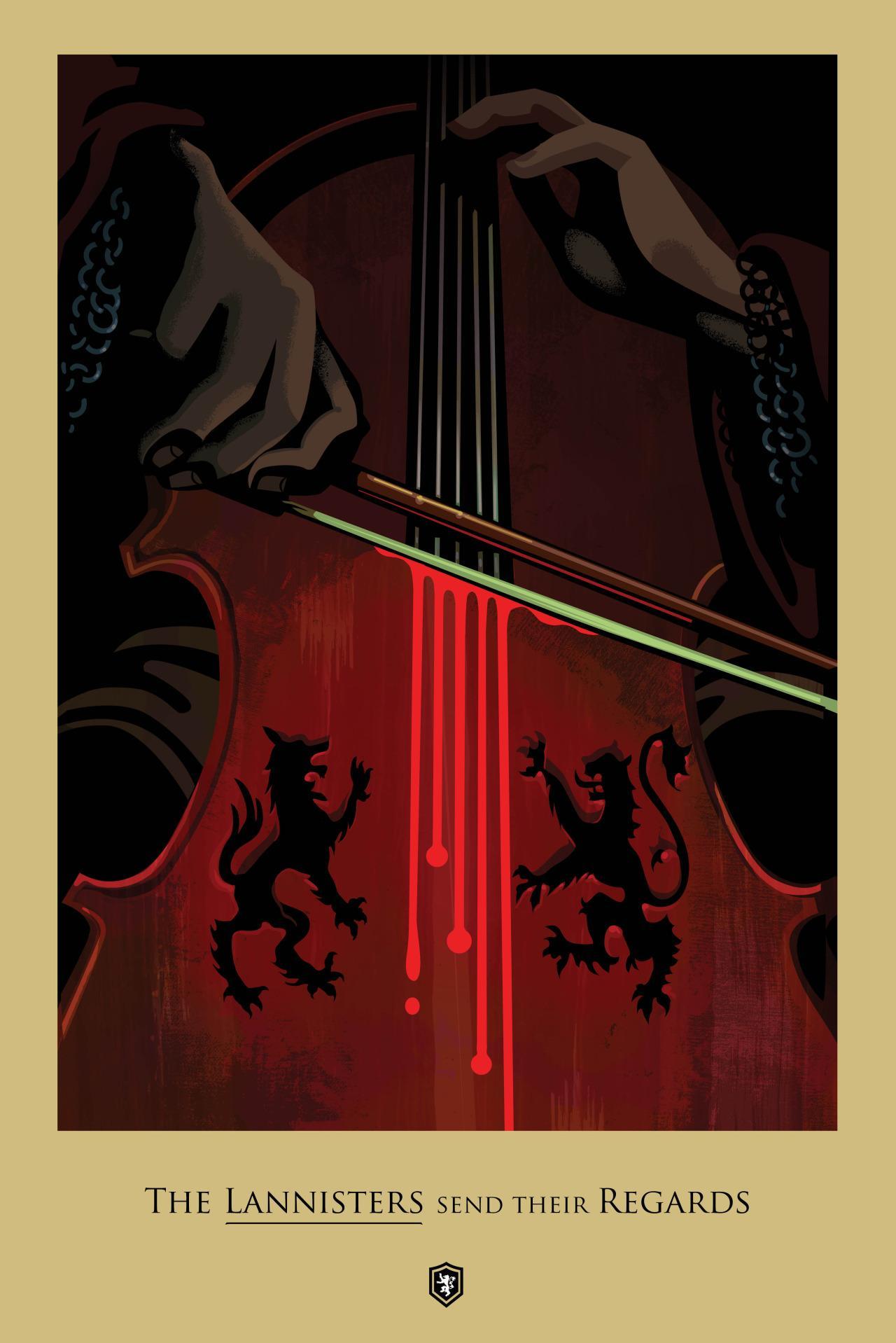
The post Game of Thrones Memory Lane 309: The Rains of Castamere appeared first on Watchers on the Wall.
Via http://watchersonthewall.com
No comments:
Post a Comment